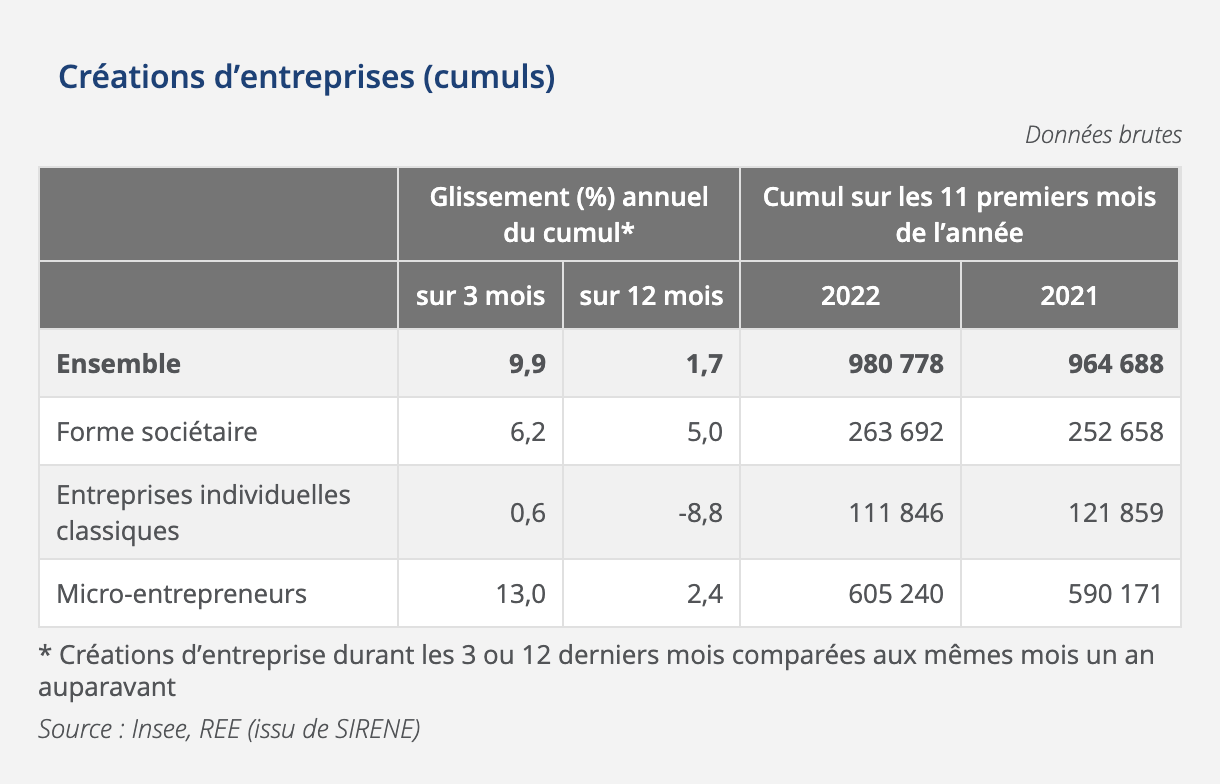Sur les 11 premiers mois de l’année 2022, l’Insee a recensé 980 000 nouvelles inscriptions. Le record de 2021, qui avait vu naître 995 868 entreprises, devrait être battu à la fin de l’année et le cap symbolique du million de nouvelles immatriculations franchi.
La création de microentreprises a toujours le vent en poupe
Sur une année glissante, l’Insee a enregistré une hausse de 1,7 % du nombre de nouvelles immatriculations, avec un fort dynamisme du côté des microentreprises (+2,4 %) et des sociétés (+5 %). 62 % des entreprises créées au cours des 11 premiers mois de l’année sont des microentreprises, au détriment, semble-t-il, des créations d’entreprises individuelles classiques dont le nombre a chuté de 8,8 %.

Après un léger recul début 2022, le nombre de créations d’entreprise a de nouveau augmenté entre les mois de septembre et de novembre, avec une hausse de 9,9 % sur un an, et de 13 % pour les seules microentreprises.
Si la livraison à domicile a fait exploser le nombre de créations d’entreprise durant la crise sanitaire, les choses ont changé et le secteur des transports et de l'entreposage enregistre une baisse des nouvelles immatriculations de 35 % sur un an. D’autres secteurs semblent séduire davantage les créateurs d’entreprise, comme celui des « services aux ménages » (+ 19 %) ou du « conseil pour les affaires et autres conseils de gestion » (+ 18 %).
Des retombées économiques incertaines
Selon François Hurel, président de l'Union des autoentrepreneurs, ce nouveau record de créations d’entreprise est révélateur d’une évolution des attentes, notamment chez les jeunes, qui se détournent du salariat et recherchent plus d’autonomie et d’épanouissement dans leur travail.
Sur le plan économique, l’apport de ces nouvelles entreprises en termes de croissance est incertain, et nombre d’entre elles ne fournissent à leurs dirigeants qu’un complément de salaire. De plus, une part non négligeable de ces jeunes structures est amenée à disparaître rapidement : sur la période allant de juillet à octobre 2022, près de 25 % des entreprises radiées avaient vu le jour pendant la crise sanitaire, et n’avaient pas encore soufflé leur troisième bougie.
Si le gouvernement a pris des mesures pour diminuer de 550 euros par an les cotisations sociales des travailleurs indépendants, afin de leur permettre de conserver leur pouvoir d’achat dans le contexte inflationniste actuel, les microentrepreneurs sont moins bien lotis : leurs cotisations sociales ne diminueront que de 0,5 % à 0,9 %, soit une baisse d’environ 185 euros par an.
En Europe, la France est le seul pays à recenser un si grand nombre de nouvelles immatriculations.
